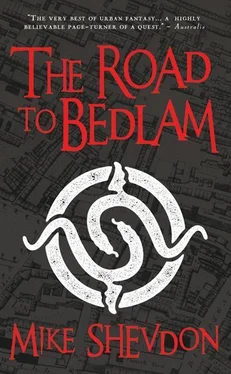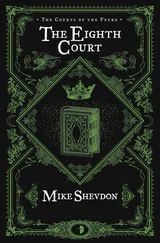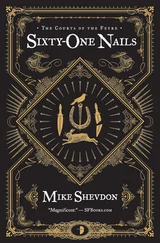Mike Shevdon - The Road to Bedlam
Здесь есть возможность читать онлайн «Mike Shevdon - The Road to Bedlam» весь текст электронной книги совершенно бесплатно (целиком полную версию без сокращений). В некоторых случаях можно слушать аудио, скачать через торрент в формате fb2 и присутствует краткое содержание. Жанр: Фэнтези, на английском языке. Описание произведения, (предисловие) а так же отзывы посетителей доступны на портале библиотеки ЛибКат.
- Название:The Road to Bedlam
- Автор:
- Жанр:
- Год:неизвестен
- ISBN:нет данных
- Рейтинг книги:5 / 5. Голосов: 1
-
Избранное:Добавить в избранное
- Отзывы:
-
Ваша оценка:
- 100
- 1
- 2
- 3
- 4
- 5
The Road to Bedlam: краткое содержание, описание и аннотация
Предлагаем к чтению аннотацию, описание, краткое содержание или предисловие (зависит от того, что написал сам автор книги «The Road to Bedlam»). Если вы не нашли необходимую информацию о книге — напишите в комментариях, мы постараемся отыскать её.
The Road to Bedlam — читать онлайн бесплатно полную книгу (весь текст) целиком
Ниже представлен текст книги, разбитый по страницам. Система сохранения места последней прочитанной страницы, позволяет с удобством читать онлайн бесплатно книгу «The Road to Bedlam», без необходимости каждый раз заново искать на чём Вы остановились. Поставьте закладку, и сможете в любой момент перейти на страницу, на которой закончили чтение.
Интервал:
Закладка:
The woman in the newspaper office was far less helpful. As soon as she realised that I didn't want to buy advertising space, she lost interest. Yes, they probably did have back copies of the newspapers in an archive but no, I couldn't look through them. Had I tried the public library? When I said I had, her expression didn't change. Two words were on the tip of her tongue and one of them was "off".
That left me with one more avenue to try before a trip to the record office became necessary. The local museum was a small affair and survived from a combination of local authority support and donations from tourists who must have got lost to end up there. The sign outside proclaimed that the Maritime Museum was open, though the windows were dark and there was no obvious sign of life.
When I pushed the door open, a small bell jangled, the sort that graced shop doorways and announced customers to men behind counters wearing brown overalls. It took a moment for my eyes to adjust. Inside was a small hallway, the wall festooned in trawl netting and blown-glass floats.
"Put wood in t'hole."
I hadn't noticed the gentleman sitting behind the desk in the room off to my left, not because I didn't see him, but because he looked like an exhibit.
"Sorry?"
"The door, lad. Shut it, before t'weather comes in."
I closed the door behind me. The bell jangled again.
"Is the museum open?"
"Y're in aren't ya?"
"I suppose so."
"We're open then."
I looked around. The museum appeared to be two terraced houses knocked into one, with an arch between them to access one house from the other. Almost every surface was covered in items of differing size and in various states of disrepair or assembly. Museums I'd been in before had display cases with carefully controlled temperature and humidity. This one had shelves and tables, desks and chairs, all covered in what could only be described as… stuff.
"It's three quid," said the man.
A sign on the desk said that all donations were purely voluntary and gratefully accepted.
I looked meaningfully at the sign.
"You get naught for nowt round 'ere," he said. "I've got change."
I delved in a pocket and came out with the money. He accepted the coins with a nod and carefully wrote me a receipt. It was unreadable.
"You pay tax?" His look said that I probably didn't. "We can claim the tax back if you do."
"No," I said. Since I'd lost my job, I didn't get paid a salary any more, so I didn't pay tax either. If I needed money, I was given some, though I had little enough to spend it on.
"Thought so."
"Is there a guidebook?" I asked.
"It's another pound," he said.
I handed over a further coin. He passed me a bundle of photocopied sheets that had obviously been read before.
"These aren't new," I pointed out.
"We'd like 'em back when you've finished. Recycling."
I took the sheets and wandered on into the house, looking at all the objects strewn randomly around. The guide was interesting enough and talked about the history of the town and the people that lived there. It provided no clue as to the origins and purpose of most of the things in the museum. I figured you probably had to be born here to know that.
Amid the collection there were farm implements, examples of lace, ancient comic annuals and discarded toys. Nothing was in any order or sequence. A rusty lobster pot provided a resting place for a child's doll with no indication that there was any relationship between the two.
On the first floor I came into a room full of photographs and pictures. There were engravings showing ships ploughing through mountainous seas in great storms, and shadowy photographs of grim-faced men hauling a lifeboat on a trailer. Sepia-tinted portraits showed families tricked out in Sunday best, hats on and children scrubbed. In amongst these pictures were photographs of men and women, a mayor and a schoolteacher, a town clerk and a governess. None were smiling.
"All dead now."
The man from downstairs was standing in the doorway. I hadn't heard him approach, which was surprising given how the wooden floors in the houses creaked as you walked.
"Some fine people," I commented, gesturing to the wall.
"They worked hard, 'n' built this town from nowt. Better than it is now. It's a shadow of what it was."
I scanned the pictures. "They don't look too happy about it."
"Don't believe it. Sitting for a portrait in them days was just that. Took forever to take a photo. Imagine standing in a starched collar, buttoned up. You wouldn't be smiling, neither."
"I expect you're right."
He walked over to stand beside me. Surveying the pictures, he pointed to an oval portrait of a rather stoic, round-faced young woman dressed in black with white lace at her collar and cuffs.
"Only time I ever saw her without a smile. She were a grand old lady."
"You knew her?"
"I should do. She were my great-grandmother."
"She must have lived to a good age, if you knew her."
"Aye. Right until after the war."
"The First World War?"
"No, second one. She died in nineteen forty-eight. Six children, and seventeen great-grandchildren. Related to half the town, one way and another."
"Quite a woman."
"You didn't mess, that was for sure. She never raised a hand, though. Didn't have to."
"How old was she when she died?"
"Into her nineties, I should think. Not the sort of question you could ask."
"That's old for those times, especially after six children."
"Aye. Never complained. Always smiling, except for that photo. Never liked a fuss made, Sea Queen or not."
"Sea Queen?"
"Aye. Used to be a big event. Parade round the harbour, a band, mayor's speech and that. Used to make a big thing of it. My sister had it one year. She were a bonny lass too."
"Runs in the family."
"Aye, well. None of 'em interested now. No call for herring or mackerel. No call for Sea Queens neither, though there's some that would like to start it up again."
"Really?"
"Always some mad bugger wants to go back to the old way."
"Not you, though? No grandchildren, wanting to follow in great-great-grandmother's footsteps?"
"They're all telly watchers now. Wouldn't know one end of a gutting knife from another. Last thing they want is to smell of fish. It's all changed."
"I suppose it has. Still, she's a grand old lady."
"She is that."
"There's something I wanted to ask," I said.
"Oh, aye?"
"These young women that have gone missing; there are posters all over town."
"I've seen 'em," he said, nodding.
"Is that a new thing, or has that always gone on?"
"What d'ya mean, gone on?"
"I was wondering. Has it always been like that? It's a small community. You could understand if people needed to get away, find a new place for themselves. Would anyone care?"
"You've never lived anywhere like this, have you?"
"I grew up in the country. This is a bit like a village, isn't it? Everyone knows everyone else's business?"
"It's a small community, I'll give you that, and people do know what each other are about, but it's not like a village. Come through here."
He took me through an archway into the adjoining house. There was one room at the back that was different from all the other rooms in the museum. It had a small table with a book open upon it. On the walls were more pictures. Some were photographs, some paintings, some black and white and some colour. One or two looked quite recent.
"Ravensby's not a village, it's a town. More important, it's a harbour town. If you've never lived in a place like this, then you wouldn't know."
"These are all boats from the town?"
"Some are, some are from other harbours. They're all still here, though, in a way."
Читать дальшеИнтервал:
Закладка:
Похожие книги на «The Road to Bedlam»
Представляем Вашему вниманию похожие книги на «The Road to Bedlam» списком для выбора. Мы отобрали схожую по названию и смыслу литературу в надежде предоставить читателям больше вариантов отыскать новые, интересные, ещё непрочитанные произведения.
Обсуждение, отзывы о книге «The Road to Bedlam» и просто собственные мнения читателей. Оставьте ваши комментарии, напишите, что Вы думаете о произведении, его смысле или главных героях. Укажите что конкретно понравилось, а что нет, и почему Вы так считаете.












